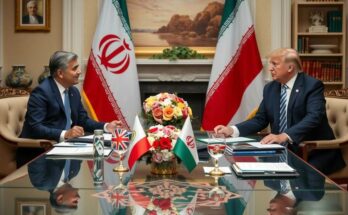The recent speeches by Brazil’s and Colombia’s presidents at the UN focused on Israel and international conflicts while neglecting the Venezuelan humanitarian crisis that significantly impacts their own countries. This inconsistency has led to widespread criticism, highlighting the need for attention toward Venezuela’s dire situation.
During the recent United Nations General Assembly, both Brazil’s President Luiz Inacio “Lula” da Silva and Colombia’s President Gustavo Petro delivered speeches that have drawn criticism for their focus on Israel while neglecting the ongoing humanitarian crisis in Venezuela. They condemned Israel for its actions in Gaza and Lebanon and expressed concern over the political turmoil in Sudan; however, they conspicuously failed to address the severe situation in Venezuela, which has led to an exodus of approximately 8 million people, more than 20% of the Venezuelan population, since 2013. Lula and Petro’s speeches, marked by grandiosity as they proposed solutions for wars in far-off regions, stand in stark contrast to their neglect of a crisis directly influencing their own nations – Colombia and Brazil. Lula presented a joint plan with China to resolve the conflict between Russia and Ukraine, which has been criticized for potentially allowing Russia to retain invaded Ukrainian territories. Furthermore, he extended his support to the Palestinian delegation and placed the majority of the blame for the conflict on Israel, while lamenting the suffering faced by Ukraine and other global regions. Conversely, President Petro’s address was heavily focused on Israel and its alleged actions against Palestinians, suggesting a genocide occurred in Gaza without adequately recognizing the long-standing threats posed by Hamas and its previous aggressions against Israel. His previous accusations of anti-Israel sentiments have fueled contention around his remarks. In contrast to their speeches, U.S. President Joe Biden highlighted the plight of Venezuelans, mentioning the electoral fraud under Maduro’s regime and advocating for global recognition of their struggles. Similarly, leaders from Argentina and Guatemala also spoke against the abuses occurring in Venezuela and the legitimacy of its leadership on the international stage. Both Lula and Petro’s exclusion of Venezuela is particularly egregious when considering they are the most affected nations by Venezuelan migration. Reports indicate over 2.4 million Venezuelans have fled to Colombia and 500,000 to Brazil. The increasing numbers of asylum requests from Venezuelans speak to the dire conditions under Maduro, raising the prospect of millions more seeking refuge if the political situation does not improve. Instead of addressing these pressing issues encompassing their borders, both leaders opted to address conflicts in regions where their influence is limited, overlooking the immediate humanitarian disaster that requires urgent attention.
The critique primarily revolves around the speeches delivered by Brazilian and Colombian leaders during the United Nations General Assembly. Both leaders condemned the military actions of Israel but failed to address the significant humanitarian crisis in neighboring Venezuela that has resulted in a massive refugee crisis. The piece underlying the opinions points out the inconsistency between their emphatic responses to international conflicts and their silence on the crisis that impacts their own countries the most significantly.
In summary, the speeches by Presidents Lula and Petro have been criticized for their failure to acknowledge the substantial humanitarian crisis in Venezuela, while focusing on international conflicts far from their borders. This oversight is particularly troubling as their nations are directly affected by the Venezuelan refugee crisis. Their addresses have prompted calls for a renewed focus on restoring democracy in Venezuela rather than engaging in discussions about conflicts they are ill-equipped to affect.
Original Source: www.miamiherald.com




